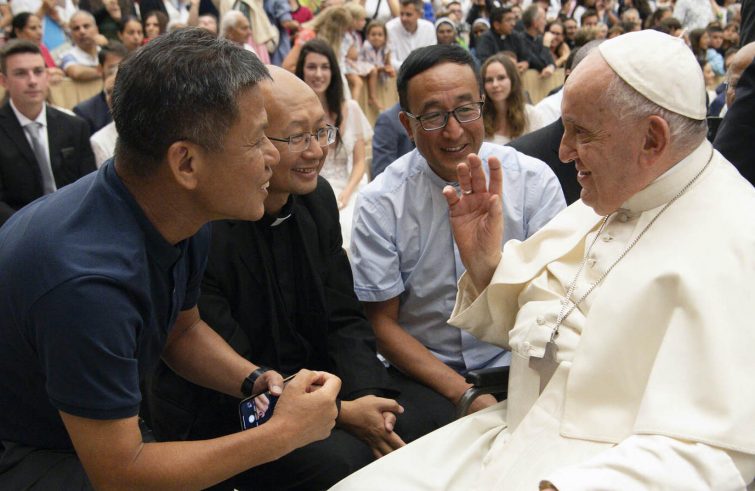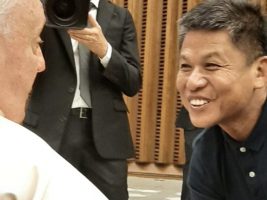
“Once again, Pope Francis has shown his great love for China and for the people of China!” “Building mutual trust is the right way to proceed.” Kin Sheung Chiaretto Yan comments on Pope Francis’ remarks on China and Chinese Catholics in Mongolia and on the papal plane. Yan lives in Shanghai but teaches at the National Seminary in Beijing, the Diocesan Seminary in Beijing and the Catholic University of St Joseph in Macau. He is the author of the book “My Chinese Dream: Gettare un Ponte tra l’Est e l’Ovest – Speranze, Sfide e Opportunità’ (My Chinese Dream: Building a Bridge between East and West – Hopes, Challenges and Opportunities’, which will be presented at the Sturzo Institute in Rome on Monday September 18. Speaking to SIR, he added: “My dream is that a simple gesture of a handshake between Pope Francis and President Xi Jinping will mark a turning point and contribute to world peace.”
Professor, as a Chinese Catholic, what were your impressions when Pope Francis took Hong Kong Cardinal John Tong Hon and Cardinal-designate Stephen Chow by the hand and said: “I would like to take advantage of their presence to send a warm greeting to the noble Chinese people. To the entire people, I wish the best, go forward, always progress. And to the Chinese Catholics, I ask you to be good Christians and good citizens. To all the people I wish the best, go forward, always progress. And to the Chinese Catholics I ask you to be good Christians and good citizens”? Why does the Pope always insist on these two aspects?
Once again, Pope Francis has shown his great love for China and for the people of China!
Evangelisation in China began when missionaries went there under the military protection of Western powers. At that time it was common to hear the saying “one more Christian, one less Chinese.” Pope John Paul II was the first to call on the Chinese people to be good Christians and good citizens, a call echoed by Pope Francis. Chinese Catholics are called to witness to their fellow citizens that they are Christians and good citizens, like all others, working for the common good of the whole country and in keeping with their own culture.
During the in-flight press conference on his return from Mongolia, Pope Francis expressed his “personal great admiration” for the Chinese people. He said that the channels for appointing bishops were “very open” and that there was a commission that had been working with the Chinese government and the Vatican for a long time. But not everything is so smooth. How can solid bridges of dialogue be built?
Given the “historical baggage”, the dialogue process between China and the Vatican has not been without incidents. Nevertheless, the road to reconciliation is now open.
The agreement between the two parties needs to be fine-tuned, not only with regard to the appointment of bishops, but also to make the path smoother. The Pope had already sent a message of greetings, good wishes and blessings to the Chinese people as he flew over China at the start of his journey. The Foreign Ministry spokesman said at a daily briefing that China wanted to “strengthen mutual trust” with the Vatican. “China,” he added, “would like to continue the constructive dialogue with the Vatican, enhance understanding, build up mutual trust”. Building mutual trust is the way forward. But first and foremost it is necessary to work for reconciliation within the Chinese Church and for dialogue with civil authorities.
Speaking to journalists on the papal plane, Francis called for moving forward “to understand each other better.” He asked Chinese citizens not to think that “the Church does not accept their culture and values, and that the Church is dependent on another, foreign power.” How can this be done? What could facilitate this encounter and mutual understanding?
For those who wish to dialogue or work with China, it is very important to know its recent history, especially the so-called “century of humiliation” at the hands of the Western powers and Japan. Even during the rule of the PRC, there were moments of total chaos: the ‘great leap forward’, the Cultural Revolution, the Tiananmen tragedy… That is why ordinary people are afraid of a repetition of these tragedies. They see that the People’s Republic of China is a system that guarantees the stability and development of the well-being of ordinary people. The Chinese government has lifted more than 800 million people out of extreme poverty. Before the pandemic (2019), more than 180 million Chinese left the country for tourism. Instead of reiterating notions of rights or freedoms, which are more individual, we need to highlight the values that are consistent with Chinese culture, especially the spirit of sacrifice for the common good, caring for the community, and the country’s propensity for unity and stability.
China is not the country portrayed by the ‘international’ press.
The system of government should be determined by the country’s history, culture and level of economic development. This is the current trend in China: the government may not change, but development policies are constantly changing to meet changing needs.
As a Chinese, how do you view Card. Zuppi’s peace mission? What are the potential fruits of this trip?
As the Pope said, Cardinal Zuppi’s mission is a mission of peace. He is scheduled to visit Moscow, Kyiv, the United States and now Beijing. Zuppi is a man of universality and great dialogue. His background includes peace efforts in Mozambique. In his capacity as Pope Francis’ envoy, he will undoubtedly pursue the path of dialogue, seeking mutual understanding and shared values in order to work with all parties involved, including China, to end the war.
You have written a book with the evocative title ‘My Chinese Dream’. What is your dream?
I dream of a world with fewer wars and conflicts, with less hunger and less indifference, with less poverty and less greed. I dream of a more fraternal world, with new relationships based on mutual understanding, trust and respect between people and between nations. I dream of a respectful dialogue between people of different cultures, faiths and beliefs, in the recognition that diversity in harmony can be a gift to each other. I dream of a world, a common home for all, for future generations, with fresh air to breathe and where young people can travel freely for exchange and mutual appreciation of history, culture, art and poetry.
I dream that the simple gesture of Pope Francis and President Xi Jinping shaking hands will mark a turning point for world peace.













